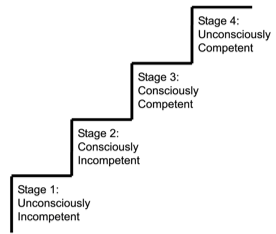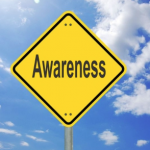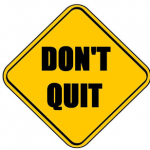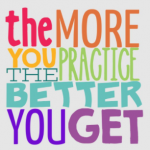How do students know they know?
“I don’t learn anything at school!” shouted my daughter (Miss 14) as she left the house. Not a new revelation from her – but today she seemed more intent on ensuring I knew I was wasting my time sending her each day. So I decided to ask the BIG question. “How do you know when you have learned something?” The response was “I don’t know!” With a heavy heart I wondered how have I let my daughter down so much? When did I miss that she didn’t understand about learning? It is what I stand for – successful learning – I’m known as the study queen to teens all over the world, a facilitator of thinking and learning to teachers worldwide and yet my daughter has no idea how the learning process works.
Feeling ashamed but not despondent, I spoke to Mr 17 and asked him the same question. He was in the middle of exams and simply answered, “I can pass the test.” Probing a bit further, he said he didn’t know.
Now I know the concept of the plumber with the leaky taps, or the builder with an unfinished house so I concede that perhaps I have not been as diligent at home as I could have been.
Now as a teacher, I would expect all my students to understand the learning process, be able to explain where they are in the process and what steps they would need to take to ensure they know they know.
 I challenge you to ask your students to brainstorm a list of how they know they have learned something. Actually can you, as a teacher, articulate what learning is and how you know it has occurred?
I challenge you to ask your students to brainstorm a list of how they know they have learned something. Actually can you, as a teacher, articulate what learning is and how you know it has occurred?
As an educator or parent what evidence do you have that learning has happened? Here is my list…
- Can your students explain it accurately?
- Can students apply the new information in various contexts?
- Are they able to teach it to others?
- Do students ask questions to further their understanding?
- Can your students accurately answer questions on the information
- Can your students give their interpretation?
- Are they able to empathise?
- Can they take on another perspective?
- Do they chat freely and intelligently about the information/skill?
- Can they write well constructed, interesting narrative?
- Have an action plan to use the information to make a difference in the world?
What would you add to this list?
Learning has many layers: It involves memory techniques, working through the hard to get to easy, being aware of the learning pit, feeling uncomfortable, consciously choosing strategies to help when it is challenging, repetition, metacognition, having a purpose – a big why, mindset, seeing the big picture and so many more facets…

Four Levels of Competence
One model I believe it is useful to understand is the Four Levels of Competence.
There are four key stages to the learning process identified by Noel Burch and more recently has been attributed to Abraham Maslow. These are valuable steps to understand in understanding the learning process for both teachers and students.
Stage 1: Unconsciously Incompetent
We all start here. This is when you don’t know what you don’t know. When you were young, you did not know that you could not tie a shoelace or drive a car. At this level we are often ignorant to the facts and ability, and maybe have a blind spot. This is where, as older learners, you may be in denial about the usefulness of a skill.
 To move to the next level learners need to see the bigger picture, of what is possible and an awareness of the possibility that they can not perform the skill or the realisation that they don’t know. They need to be able to recognise their own incompetence and develop a value proposition towards learning the new skill.
To move to the next level learners need to see the bigger picture, of what is possible and an awareness of the possibility that they can not perform the skill or the realisation that they don’t know. They need to be able to recognise their own incompetence and develop a value proposition towards learning the new skill.
Stage 2: Consciously Incompetent
This is when you know you don’t know. You now have a strong awareness of your lack of skill and or ability. Following the earlier example, you now know you cannot tie a shoelace and cannot drive a car.
 This stage is when many people are likely to be discouraged and quit as the gap of incompetence often seems so big, you can’t see the possibility of being able to achieve the task. Learning at this stage requires demonstrations and encouragement, as well as building the vision of being able to successfully complete the skill. Making mistakes is a critical part of being able to move forward from this level.
This stage is when many people are likely to be discouraged and quit as the gap of incompetence often seems so big, you can’t see the possibility of being able to achieve the task. Learning at this stage requires demonstrations and encouragement, as well as building the vision of being able to successfully complete the skill. Making mistakes is a critical part of being able to move forward from this level.
Stage 3: Consciously Competent
Now the learning of the new skill starts. It is essential to break it down into manageable steps and this level requires concentration. When learning to tie a shoelace, the internal (or it may be external) voice repeats: over, under, through, pull, make a loop, etc… Do you recall learning to drive a car? Having to think about all the steps: Clutch, first, hand brake, clutch, accelerator, mirrors – “don’t talk to me while I’m driving!”
 At this stage everything feels stiff and awkward. Frustration will be plentiful. Feedback is essential and every small improvement significant. Coaching may be essential here as well. It is also important not to get cocky or arrogant at this stage, as then the learning process can stagnate or stop. Hands-on practice is the key here.
At this stage everything feels stiff and awkward. Frustration will be plentiful. Feedback is essential and every small improvement significant. Coaching may be essential here as well. It is also important not to get cocky or arrogant at this stage, as then the learning process can stagnate or stop. Hands-on practice is the key here.
Stage 4: Unconsciously Competent
After all the active, slow and steady practice comes the fourth stage of when the skill becomes automatic, or at least can be performed without conscious effort. This is when you do not need to think about how to tie a shoelace or drive a car – you just do it.  The skill becomes second nature or perhaps can be described as a habit. More consolidation may need to occur at this level, as you continue to refine the skill or ability.
The skill becomes second nature or perhaps can be described as a habit. More consolidation may need to occur at this level, as you continue to refine the skill or ability.
Recognising (both for the teacher and the student) which step they are at, when learning a new skill, can alleviate the frustration of the slowness it takes for their learning to occur. Research tends to indicate it can take between 21 -26 days of active participation to move from one stage to the next. Of course this depends on the motivation level, initial skill level, your ability to think about your thinking and the desire to do the hard work.
The essential part to remember for both student and teacher is learning takes time and allowing time for each stage will help.
Now to go and explain this to my children…
Tags: 4 stages of competency, Karen Boyes, Learning to learn
Published on Friday, November 11th, 2016, under Learning, Teacher Effectiveness, Transformational Learning

I love your honesty Karen. Thanks for sharing your expertise and asking really useful questions to challenge our practice. 🙂 Always inspirational x
Hi Karen, I smiled a lot at this as I had the same issue with my sons. I think your process of learning hierarchy is a useful concept, however, there is another part to this that you have probably considered but not mentioned is the relevancy of material. My son (master 18), although quite intelligent, understood the process of learning often retorts with “relevancy dad, the stuff they are teaching us has no relevancy to the real world or real situations”. What he was outlining was the relevance of knowing the “process”, to the desired outcome. Your comparison to plumbers and builders is apt the desired outcome is to have the leak plugged, or the house built. Expressing a view or opinion does not necessarily create the desired outcome, in fact, can be counter-productive and identified as “negative”. Two examples come to mind. Teachers training institutions and recent events in America. Young graduates from Uni in teaching, often fall into the awkward situation of attempting to apply theoretically based process of learning without the appropriate training for the ‘actual events”. Special education is a specialised field and requires a specific approach to addressing learning needs. Beginning teachers are often ill-equipped to deal with this type of situation, Show me.instead, explain why its relevant to what I do ? I can hear the response already, but the reality ? I have often heard senior teachers say I’ve done my time…It’s their turn… self-centred ? perhaps. In America, where pollsters and political pundits pointed to a Clinton victory, are now eating humble pie. Why ? because the thing that was missed was the undercurrent of human discontent, and Education is no different. No amount of “processes” identification and implementation is going to matter to the disaffected. If we do not listen to the voices of student and industry and make subjects relevant we do so at our peril.
Yes! I totally agree with you and whist we still have an exam system based on memory and recall students still have to learn ‘stuff’ that is unlikely to have relevance. Number one job of a teacher should be to create relevancy – yet as you suggest – they have not been taught how. There is still much work to do in our education system.
Thanks for taking the time to share your comments and concerns – I hear you loud and clear 🙂
Rainbows and sunshine
Karen
[…] students understand the learning process (see my blogs; How do students know they know?, Everything is hard before is is easy, MLE’s – the underlying philosophies) and have […]
[…] students understand the learning process (see my blogs; How do students know they know?, Everything is hard before is is easy, MLE’s – the underlying philosophies) and have […]
[…] wrote about some of this is another article, ‘How do students know they know.’ Unknowingly, schools often glorify the results, not the thinking, mindset, dispositions and hard […]